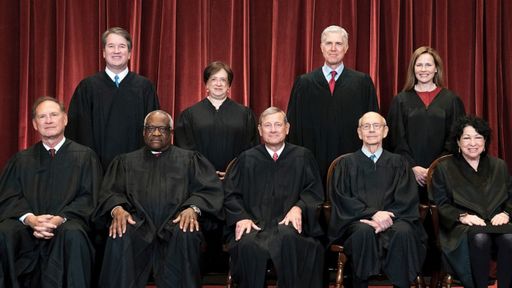On expectations – Jeannie Suk Gersen in The New Yorker;
‘The Supreme Court term that began last fall has spanned several epochal upheavals at once: the second peak and wind-down of the coronavirus pandemic, the 2020 Presidential election, and its dramatic aftermath, including the violent mob attempt to block the certification of the outcome. During the term, oral arguments were conducted entirely by telephone, a low-tech option that had the effect of keeping the Justices less visually accessible to the public.’
(…)
‘But, if the expectation was that the country’s political divisions would be mirrored in starkly split decisions, it mostly was not met. The Court didn’t even attempt to decide the 2020 Presidential election, as Donald Trump wanted it to and as many feared that it would. Instead, the Justices repeatedly defied expectations, with conservatives and liberals together forming majorities in high-profile cases in order to avoid or defer the fighting of deeper wars.’
(…)
‘For the third time, Republicans had asked the Court to strike down the Affordable Care Act as unconstitutional. But, also on June 17th, the Court refused, by a vote of 7–2, with Justices Alito and Neil Gorsuch dissenting. The big issue on which a partisan divide was anticipated was whether the law became unconstitutional when Congress, in 2017, nullified its “individual mandate.” In a decision written by Justice Stephen Breyer, the Court was able to avoid answering entirely—and to avoid invalidating Obamacare—by holding that the eighteen states and two individuals who had brought the suit did not have standing to challenge the law, because they weren’t concretely injured by its enforcement. Justice Alito lamented that “fans of judicial inventiveness will applaud once again,” which was not a compliment.’
(…)
‘The Justices presumably understand that, if we fail to channel social conflict into legal means, it will, in part, reflect poorly on their job performance. And if the Court’s decisions lose the public respect that undergirds its power, it may aggravate, or even generate, social conflict. This term, the Justices worked hard at conflict management. At times, they even appeared to be demonstrating how to properly practice politics: reach broad agreement on narrow issues, enhance legitimacy, and avoid coming to partisan blows. As the Court turns to next term’s cases on abortion and gun rights, we’ll see how long its defiance of expectations can last.’
Read the article here.
Without trust the power of the supreme court, or any court, will quickly evaporate. One of the characteristics of a dictatorship is that the power of the courts consists of the guns of the soldiers and policemen protecting the courts.
The wisdom of these judges, at least for now, is that they appear to be willing to ignore some of their own ideological preferences in order to preserve the institution they are part of.
Their pragmatism, at least in some cases, might be nothing but a survival instinct, but it serves the common good.
